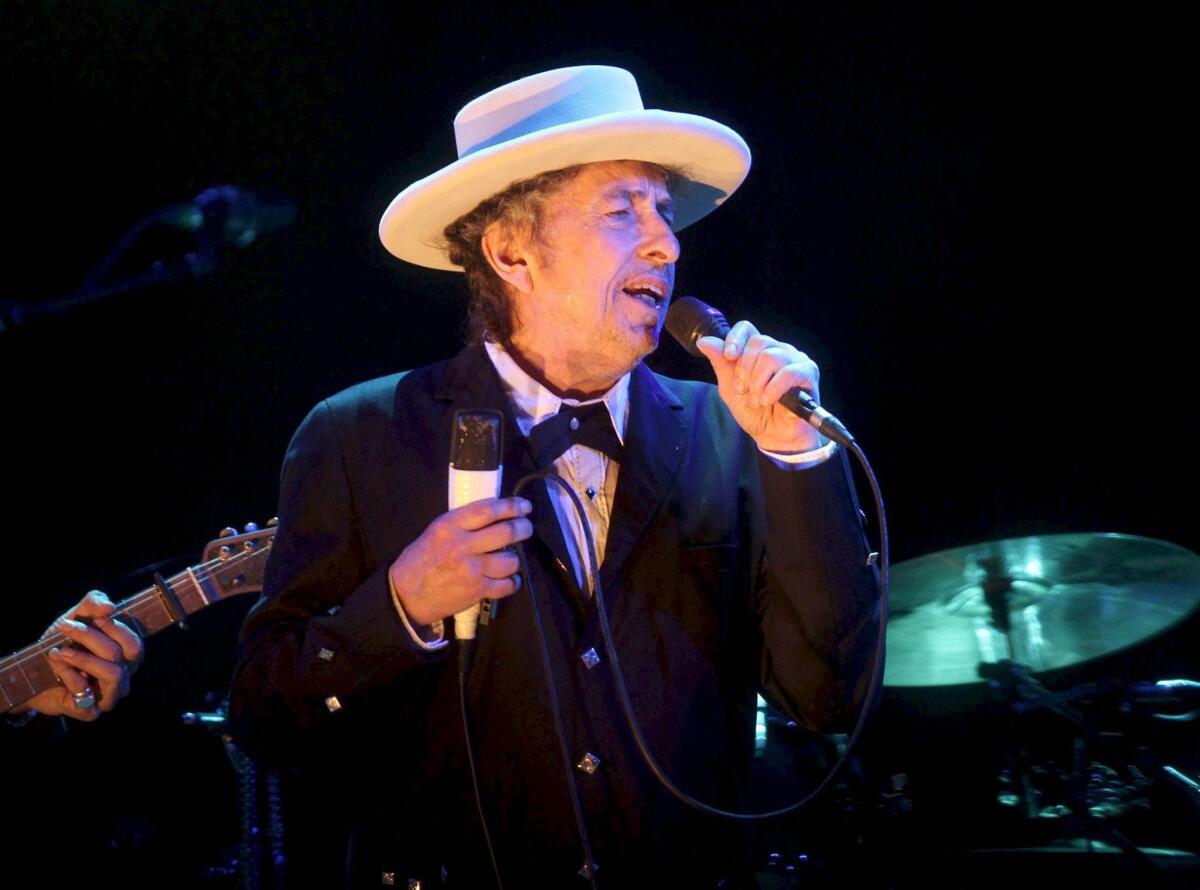Opinion: Dylan stands mute on his Nobel Prize — but will he show up for the ceremony?

Bob Dylan performing at the Benicassim International Music Festival in Spain in 2012. The songwriter has won the Nobel Prize for literature.
- Share via
It’s been five days since the Nobel Prize committee announced its annual award for literary achievement would go to Bob Dylan, who has been a bit enigmatic about the honor. The Swedish Academy says it has yet to have direct communication with the legendary singer/songwriter, and Dylan has not spoken publicly about it, though as Times music writer Randy Lewis intuited the other day, Dylan may have said something with his song selections at the Desert Trip festival in Indio over the weekend.
Will Dylan accept his Nobel? Will he attend the award ceremony in Stockholm in December? Who knows. But there is precedent for saying “never mind,” skipping the ceremony, or sending a proxy.
The Nobel is one of the world’s most scrutinized prizes, setting off annual debates across the sciences, literature and international politics over the appropriateness or inappropriateness of the award-winners. Usually the winner themselves are excited and grateful – but not always.
Jean-Paul Sartre, the French existentialist and political leftist, won the literature prize in 1964 “for his work which, rich in ideas and filled with the spirit of freedom and the quest for truth, has exerted a far-reaching influence on our age.”
Sartre, ever mindful of politics and perceptions, had warned the academy he would decline the award if granted. He feared being aligned with an organization that he believed ignored non-dissident Soviet writers and others from within the communist sphere, according to Ronald Hayman’s “Sartre: A Biography.”
And when the announcement came, he demurred, as promised, and the ensuing storm of controversy led him to offer a further public explanation framed by the Cold War tensions between East and West, and his perception of the artist as a political actor.
There is precedent for saying ‘never mind,’ skipping the ceremony, or sending a proxy.
“A writer who adopts political, social, or literary positions must act only with the means that are his own—that is, the written word. All the honors he may receive expose his readers to a pressure I do not consider desirable. If I sign myself Jean-Paul Sartre it is not the same thing as if I sign myself Jean-Paul Sartre, Nobel Prizewinner. … The writer must therefore refuse to let himself be transformed into an institution, even if this occurs under the most honorable circumstances, as in the present case.”
No other winner was selected.
Alexander I. Solzhenitsyn, the Soviet dissident, won the prize in 1970 “for the ethical force with which he has pursued the indispensable traditions of Russian literature,” but postponed acceptance because he feared the Soviet Union would not let him return if he left the country. The Soviets eventually exiled him in 1974, and he collected his prize then.
The year before, author Samuel Beckett split the difference. Naturally shy and quiet, Beckett valued his solitude, particularly when it came to writing. He feared the celebrity that comes with winning a Nobel would be disruptive, and rumors that he would likely be named sent him and his wife, Suzanne Déchevaux-Dumesnil, off to a sudden vacation to rain-soaked Tunisia, hoping to hide form the press until the publicity died down.
On Oct. 12, Beckett’s publisher in Paris, Jerome Lindon, telegraphed: “In spite of everything, they have given you the Nobel Prize. I advise you to go into hiding. With affection.” Lindon reached Suzanne Beckett by telephone the next day to confirm the news, to which she replied: “Quelle catastrophe.” Reporters tracked the Irish-born writer down in Tunisia, where Beckett finally confronted the reality that the spotlight was on him.
According to biographer James Knowlson, Beckett feared turning down the honor would create even more of a media storm, controversy, scandal and, ultimately, more disruption. So he graciously accepted, sat briefly in the hotel lobby for the obligatory photo shoot (no questions allowed), sent Lindon to the ceremony in Stockholm, and gave away the prize money (often anonymously to needy writers and artists in Paris).
In short, Beckett rode it out.
So what will Dylan do? Ride out the moment? Ignore the prize? Send an agent? Or sing “Ballad of a Thin Man”?
Ah, you’ve been with the professors and they’ve all liked your looks
With great lawyers you have discussed lepers and crooks
You’ve been through all of F. Scott Fitzgerald’s books
You’re very well-read, it’s well-known
But something is happening here and you don’t know what it is
Do you, Mr. Jones?
Follow my posts and re-tweets at @smartelle on Twitter
UPDATES:
4:38 a.m. This post was updated to correct the name of the city where the awards ceremony is held.
More to Read
A cure for the common opinion
Get thought-provoking perspectives with our weekly newsletter.
You may occasionally receive promotional content from the Los Angeles Times.











